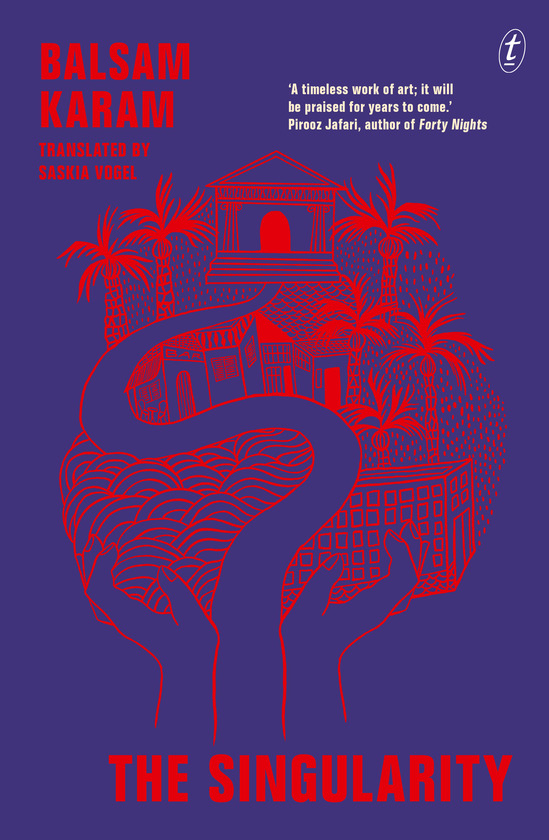Meanwhile elsewhere—” begins Balsam Karam’s The Singularity, depicting an unparticularized city; cars, highways, half-desert and mountains, the ever-rising ocean. Later there’s a description, almost as if a sales pitch for this tourist town.
He says he knows the city has been ravaged by the war but the architectural solutions are so fascinating. The fact that the buildings covered in bullet holes have been left standing among newly built hotels and skyscrapers along the corniche—doesn’t that just say everything about the world today?

Outside the boundaries of the text, in biography, there are some markers: Balsam Karam is an Iranian-Kurdish writer, she spent a blink of her childhood in Tehran, then immigrated to Sweden. Vogel herself is known for translating numerous formally experimental Swedish narratives into English. Karam has written another novel, still untranslated, titled Event Horizon—another scientific/philosophical term about space and time. But inside the novel, the text is about the great disaster, erasing all particularity except the loss of a child. The text lays bare a ruined city composed of ghettoized alleys and tarpaulin sheets, its landmarks receding into memory, marked only by the presence of loss, “a great loss” splitting time into segments.
There are two women. A mother seeks her missing child, repeating movements through the city; a mother returns as a tourist, pregnant, child dead in the womb. The text erases precision in the face of this loss, despite the litany of other voices, other losses. It circles, repeats, barely moves, becomes unrecognizable, becomes everyman and everywoman. It beckons witness by becoming universal. It could be any city, any disaster, any of our pasts, any of our futures, a present elsewhere. William Gibson famously wrote, “The future is already here, it’s just not very evenly distributed.” Others added corollaries, saying that this is dystopia, that dystopia is realism rendered new. Maurice Blanchot wrote, “The disaster is forgetfulness without memory … the immemorial, perhaps. To remember forgetfully: again, the outside.”
***
I do not think this is a forgiving novel. The Singularity comingles the particularity of a singularly effected disaster by subsuming it into the universal. This is perhaps why it has been read as a universally relevant narrative of motherhood; of a mother’s unbearable attention upon one child while the rest of the children generally suffer—a voice amidst a litany of voices, disaster conferring favoritism. “Of all my children …” the mother bargains in a prayer, “she was the one I loved most.” The people who, once lost, once struck by disaster, become lodged in the throat as immemorial.
The novel has similarly been read as an intergenerational epic in broad strokes: two-hundred pages spanning grandmother, mother, children, in a story of those exiled or displaced by unnamed yet inescapable violence. The novel can, differently, be read as a narrative of built structures, the kind of unmappable city that Renee Gladman and Julio Cortazar delight in, slowly reproducing eerie and uncertain contours that cannot be quantified or measured. The rocks of children’s play become mountains; the repetition of a mother’s necessary perambulations becomes a road, the state-enforced and official structure intermingles with the city of every day use.
The narration is realist, but this does not detract from the estrangement that it provokes. The narrative proceeds through loops, repetitions, interjections. In the first half, each section begins on the same day—“one Friday morning”—and each day blurs to look the same, time becoming incoherent for its characters and reader alike. In the second half, sentences are run on, split by oblique entries, the past needing to be spun out of the interminable present. Loss particularizes, and so names and memories stick out like sore thumbs, the daughter, the best friend, the sister. They’re stuck in time, anchoring the past in the immediacy of grief. In other words, the novel is an impasse in the crevice of realism. The social forces at work appear localized yet interchangeable—the war, the military, the police—leaves only a scene of continuous immiseration, and in this, a semblance of something global also appears. Karam’s style belongs to the quasi-modernist tendency of producing impressions, yet its strangeness possesses the auto-fictional force of fluidity, its sentences not run-on as much as rippling and doubling. And in collapsing space and time, in form and content both, it speaks to the fluid alienation of our contemporary.
***
Nonetheless, for all its perambulations and patrols through this reality effect, there is a pivotal act, and the novel begins at the end of a life.
You don’t see the blood, you only see the woman, and soon thereafter the woman throwing herself off.
The narrator addresses—a few pages in—the second woman, the pregnant tourist, the one who migrated to a welfare state at six-years-old, in second person. “You” it goes, “you see …”. Nothing could be clearer: how does she, how do you, witness the suicide of a mother in a war-torn country who dies in search for a child? The novel mostly moves meanderingly backward from this point. It isn’t for nothing that the child who was kicking in the second woman’s belly, moments before a mother jumps off the corniche, punctuates this act by dying. What does witnessing do to the person who, without intending to, watches?
[A]nd a scream rang out that you later hoped was yours even though you’ve never been able to scream like that.
The Singularity concerns itself with the aftermath of witnessing. The event of a woman’s suicide takes the reader and narrator into memory. We catch glimpses of a woman’s life and that of her mother and children. Still, the patchwork the second woman is left with does not serve as clues of a larger puzzle. There is no larger puzzle. They do not tell a life. Instead, they inflect, paralyze, create doublings, make stops and starts. Blanchot, in Writing the Disaster, speaks of this paralysis and passivity at a slant, a tortured act of meaning making while being stuck in time.
We are passive with respect to the disaster, but the disaster is perhaps passivity, and thus past, always past, even in the past, out of date.
Instead, the act of witnessing something singular in the midst of totalizing immiseration creates, quite literally, “a black hole”. This is what witnessing does: witnessing kills something inside you. witnessing stops time. witnessing requires repeating itself, and in the repetition, it revivifies. In the novel, witnessing appears as constantly reaching to get closer to the act. Repetition is an act of hope. Passivity an act of honour. Even in the collapse of space and time, “the black hole” of the singularity tries to collapse the distance between the lost. Karam’s novel takes on an ambitious task. By narrating a loss, she attempts to make time and all form meaningful again.
***
Karam’s novel can feel harrowing and unevenly paced, atonal in its chorus of loss and longing, drawn out in its account of sufferings through circles of limbo and hell. What I loved most about it, however, was its small and subtle dramas of recognition and misrecognition, all within less than two-hundred pages. A mother mistaken for another, grandmothers looking for grandchildren in their mothers, children not tugging and pulling at their mother because she appears distant and different—so many particularities lost and also discovered in these moments.
The best one is perhaps Karam’s play on Freud’s game of childhood’s repetitive compulsions in a longer section detailing many of childhood’s imaginative games. In Freud’s telling, the game involves a child repeatedly throwing a cotton reel where it could no longer be seen and then drawing it back out. In The Singularity, the other children chance upon a ball, and finding no mother, no other to play with, they simply toss it back and forth among themselves—recognizing in each throw, a loss, and in each pass, a return—and in doing so, encompassing the arc of the novel.
The loss repeats itself. As does the search. For as many mothers. For as many women. This is a listlessly beautiful novel because it refuses to forget.

Shinjini Dey
Shinjini Dey is a graduate student as well as a writer of criticism and essays. Her work has been published in Dilettante Army, Los Angeles Review of Books, Strange Horizons, and others. Find her on X/Twitter at @shinjini_dey.
